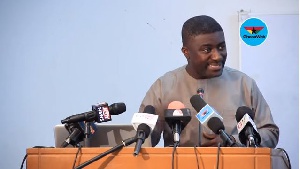Over 50 Civil Society Actors were on Tuesday schooled on the Representation of the Peoples Amendment Act (ROPAA) whilst soliciting their input as strategic stakeholders towards the implementation of the Diaspora electoral law.
Dr Eric Bossman Asare, Chairman of the Electoral Commission ROPAA Implementation committee, explained issues bordering on requirements for registration, authentication of resident permit, and registration centres and polling stations.
Other issues discussed included appointment of registration and election officials, mode and frequency of registration, designs of registration forms, challenges at registration, handling registration challenges, petition against decisions of the overseas registration review committees and exhibition of the voters register.
Dr Asare who is also a Deputy EC Chairman, explained that the implementation of ROPAA required that the Commission puts together regulations, in the form of a Constitutional Instrument (CI), to regulate the registration of voters and the conduct of elections in foreign countries.
He said at the end of the work of the ROPAA Consultative and Implementation Committee, a technical group would be constituted to draft regulations for external voting, then it would eventually be passed into a CI by Parliament by the close of December 2019.
He said ROPAA, today gives the Ghanaian citizens living outside the country the right to be registered as a voter and to vote where he/she lives; "It has been 12 years since ROPAA became law, but Ghanaian citizens living outside the country are yet to benefit from the opportunities presented by ROPAA.
"This is because of the obvious challenges that are likely to be encountered in the implementation of ROPAA".
He recalled that in the past, attempts were made by the EC, under the leadership of Dr Kwadwo Afari-Gyan to find a way of implementing ROPAA that would be acceptable to all stakeholders, by setting up a committee in 2011 to make recommendations for the ROPAA implementation.
"Seven years on, the right to be registered as a voter and to vote in public elections and referenda remains elusive to the Ghanaian living outside Ghana,” he said.
Dr Asare said a lot has changed since the Committee set up by Dr Afari-Gyan presented its report; stating that, it was necessary that in trying to implement ROPAA now, stakeholders take into account the new developments in Ghana's electoral process.
He said it was for this reason that the Consultative and Implementation Committee was formed to continue with the process after it was put on hold from 2011.
The Reverend Dr Ernest Adu Gyamfi of the National Peace Council who is a member of the EC ROPAA Committee, explained the various issues and appealed to the CSO actors to send memorandum to the Committee.
Dr. Koma S. Jehu-Appiah, Country Leader for Ipas Ghana, expressed concern about the ROPAA, urging state actors to tread cautiously as any technical challenge could plunged the nation into electoral crisis.
Ms Mabel Viviey, Communication Officer of StarGhana Foundation, stressed that in spite of the challenges, “Ghana should go ahead and implement it, whilst addressing progressively the challenges as and when they appeared”.
Mr Bright Appiah, Child Rights International, supported argument for compilation of data based for all Ghanaians outside, “Ghanaians in the Diaspora must register at all our embassies.
“We must first have a data base, know the number of Ghanaians we are dealing with who are eligible to vote,” he said.
Following advocacy by interest groups, a Bill was introduced in Parliament in 2006, the Representative of the People Amendment Bill (ROPAB) to amend the representation of the People's Law of 1992 PDNC Law 284.
The PNDC Law 284 did not make provision for Ghanaian citizens other than persons working in Ghana's diplomatic missions, persons working with international organisations of which Ghana is a member and Ghanaian students on Government scholarship, to be registered in the countries where they reside.
The ROPAA, Act 2006, ACT 699 was therefore passed to extend the right of the Ghanaian to participate in voting in public elections and referenda to Ghanaians living outside Ghana.
The nine-member EC ROPAA Committee is chaired by Dr Asare, EC Deputy Chairman, in-charge of Corporate Services with Mr Christian Owusu-Parry, EC Director of Administration as the Secretary.
Other Members of the Committee include Mrs Adwoa Abrefa Asuama, EC Member; Mr John Boadu, General Secretary of the New Patriotic Party (NPP); and Dr Benjamin Kumbuor, a leading member of the National Democratic Congress (NDC).
The rest are Reverend Dr Ernest Adu Gyamfi of the National Peace Council; Professor Ransford Gyampo of the University of Ghana, and Dr Kojo Asante of the Centre for Democratic Development (CDD) Ghana and Mr Kofi Akpaloo, representing the other minority parties.
Politics of Wednesday, 17 April 2019
Source: ghananewsagency.org
EC ROPAA committee schools Civil Society Actors
Business
















